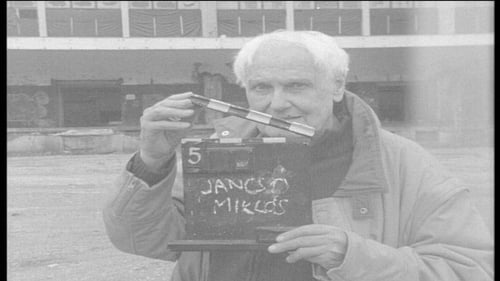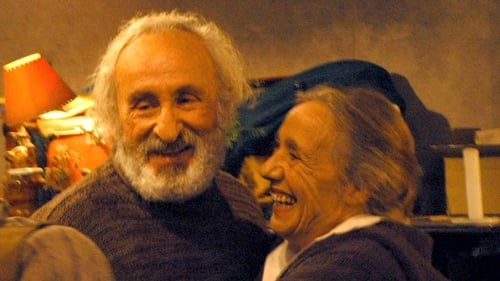Judit Elek
Birth : 1937-11-10, Budapest, Hungary
History
Judit Elek (born 10 November 1937; Budapest) is a Hungarian film director and screenwriter. She has directed 16 films between 1962 and 2006. Her film Mária-nap was screened in the Un Certain Regard section at the 1984 Cannes Film Festival.
She graduated in 1961 from the Academy of Drama and Film in Budapest (now the University of Theatre and Film Arts Budapest), and joined Mafilm as an assistant director. She is one of the founders of the Béla Balász Studio for young filmmakers. Between 1962 and 2011, she made multiple short films, documentaries and features. The renowned film Mária-nap (1984) screened in the Un Certain Regard section at the 1984 Cannes Film Festival. She was also one of the participants in the IFFR jubilee project 25 Encounters. Elek’s films are the subject of a focus programme at IFFR 2023, featuring titles such as Találkozás (1963), Kastélyok lakói (1966) and Istenmezején, 1972-73-ban (1974).

Director
Concert-film-screening to the memory of László Melis

Director
Katherine, who survived the Holocaust at age seven, visits her fatherland of Transylvania, Romania for the first time departing from Sweden with her family. Not only do both happy and frightful memories of her forgotten past come to life, but she must also face the depressing reality of Ceausescu's communist dictatorship and the romance developing between her husband and her sister. Parallel to her story and simultaneously, we get to know her childhood love and friend Sandor, who serves the dictator as a forester and whose story has a tragic ending. The film ends with the surprising and odd encounter of the two stories.

Self
Reconstructions of unrealized Hungarian films in cooperation with the greatest Hungarian film directors.

Producer
After her husband's death, Hanna Szendroy, the former primadonna, portrayed by Maya Komorowska is caught in the claws of the real estate mafia. She looses her lavish home and ends up homeless at the Keleti train station. When she returns to her house, now full of homeless people moved in by the real estate mafia, an unexpected relationship brings hope into her life again.

Writer
After her husband's death, Hanna Szendroy, the former primadonna, portrayed by Maya Komorowska is caught in the claws of the real estate mafia. She looses her lavish home and ends up homeless at the Keleti train station. When she returns to her house, now full of homeless people moved in by the real estate mafia, an unexpected relationship brings hope into her life again.

Director
After her husband's death, Hanna Szendroy, the former primadonna, portrayed by Maya Komorowska is caught in the claws of the real estate mafia. She looses her lavish home and ends up homeless at the Keleti train station. When she returns to her house, now full of homeless people moved in by the real estate mafia, an unexpected relationship brings hope into her life again.

Director
Erno Fisch, the film's protagonist, was born in 1903 in Sighet, the same small town as his world-famous compatriot, Elie Wiesel. Erno Fisch was the only Jew in his town that survived the Holocaust. He escaped deportation by hiding in the forest for six months. From his memories, we find out about everyday life in the area, which later became a part of Romania. Erno Fisch lived in an era when being Jewish did not mean being different, and when he could go to a Catholic school, just because it was closer. His life-story exemplifies the fact that resignation is not the only answer to the challenges of life and history.

Director
Elie Wiesel returns home for the first time since the liberation in this documentary by Judit Elik.

Editor
1952, Budapest. Kati is thirteen years old when her mother dies. Her father works as a founder at the Miskolc foundry, deprived of his former position of director-engineer. Kati is left alone in their flat, transformed into a place crowded with tenants. That is, not quite: in her imagination her mother is alive again, for she still needs her.

Screenplay
1952, Budapest. Kati is thirteen years old when her mother dies. Her father works as a founder at the Miskolc foundry, deprived of his former position of director-engineer. Kati is left alone in their flat, transformed into a place crowded with tenants. That is, not quite: in her imagination her mother is alive again, for she still needs her.

Director
1952, Budapest. Kati is thirteen years old when her mother dies. Her father works as a founder at the Miskolc foundry, deprived of his former position of director-engineer. Kati is left alone in their flat, transformed into a place crowded with tenants. That is, not quite: in her imagination her mother is alive again, for she still needs her.

Writer
In the 19th century Austro-Hungarian Empire, David Hersko, a Jewish shepherd, witnesses the attack of a young girl. His home is burned down and he finds shelter with the family of a Jewish logger. The loggers find the body of a young woman which they bury, going against local laws. They are charged with her murder and it is believed that they killed her as a ritual murder.

Director
In the 19th century Austro-Hungarian Empire, David Hersko, a Jewish shepherd, witnesses the attack of a young girl. His home is burned down and he finds shelter with the family of a Jewish logger. The loggers find the body of a young woman which they bury, going against local laws. They are charged with her murder and it is believed that they killed her as a ritual murder.

Director
The Hungarian Maria's Day is set in that most fateful of years, 1848. The incredible changes and reverses in European politics and culture exert a potent influence on one aristocratic Hungarian family. Losing virtually everything in the way of creature comforts, the family tries to keep up appearances. Eventually every member of the clan falls victim to illness, syphilis and their own headstrong foolishness. The parallels drawn by director Judith Elek between the dissipation of 19th century Hungarian aristocracy and the corruption of Communist ideology in modern times are inescapable.

Director
Film by Judit Elek.

Director
For this austere, clear and sharp telefeature, Judit Elek focused on the last months of Martinovics’ life: his interrogation by the Austrians, the examining Magistrate Schilling in particular, shown as a battle of wits as well as delusions – on both sides. Elek had wanted to make this film in the early 1970s, but wasn’t allowed to. When she finally got the chance, the reactions were predictable, as the parallels with recent Hungarian history were simply too obvious for officialdom not to feel anxious. History may not repeat itself, but the variations look eerily similar...

Director
The second part of Judit Eleks long-term documentary about two girls and their lives in a small Hungarian village. What has become of their dreams and hopes?

Writer
An orphan girl suffers abuse from her adoptive parents.

Director
In March 1974, Hungarian television recorded a concert by Tamas Cech and Ad Libitum as a live concert for two days (16-17) in the largest lecture hall of the Budapest University of Technology in front of a crowded student audience. The recording was made in black and white on magnetic tape by a car that drove up to the building.

Director
The first part of Judit Eleks long-term documentary portraits the lives of two girls in a small Hungarian village: Marika and Ilonka. As they grow up, they have to decide between working and learning or marrying at the age of 15 and living up to their parents' expectations.

Director
A television documentary about miners: the reality of their work versus how it is made to look and sound in the public sphere. It contrasts real people speaking in their own voice with the way officialdom speaks about them.

Idea
Persuaded by the janitor's wife, a lively, but lonesome old woman, who is only attached to the world through her cherished objects and memories, decides to exchange her two-room apartment for a smaller one. For a little while her everyday life is changed. She meets and entertains new people every day.

Director
Persuaded by the janitor's wife, a lively, but lonesome old woman, who is only attached to the world through her cherished objects and memories, decides to exchange her two-room apartment for a smaller one. For a little while her everyday life is changed. She meets and entertains new people every day.

Director
This two-part film examines the plight of the working class. In part one, an elderly factory laborer goes to work in his last days before he is forced to retire. He leaves the factory life he has always known and goes home to his wife. In the second part, a young farm boy goes off to an industrial trade school to prepare for the very work the old man left behind. The old man loses his freedom by forced retirement while the young man loses his freedom by becoming a worker faced with a lifetime of factory work.

Director
The film shows the heartbreaking state and life of the castles of Keszthely, szecseny, godollo, szigliget, hedervar and their former inhabitants.

Director
A man, a woman, an afternoon, a city, and an unspoken, hopeful desire to find love by way of the personal ads. A milestone of Hungarian cinema, Elek uses documentary techniques in a fiction context to make the frailty of everyday life as palpable as possible.



